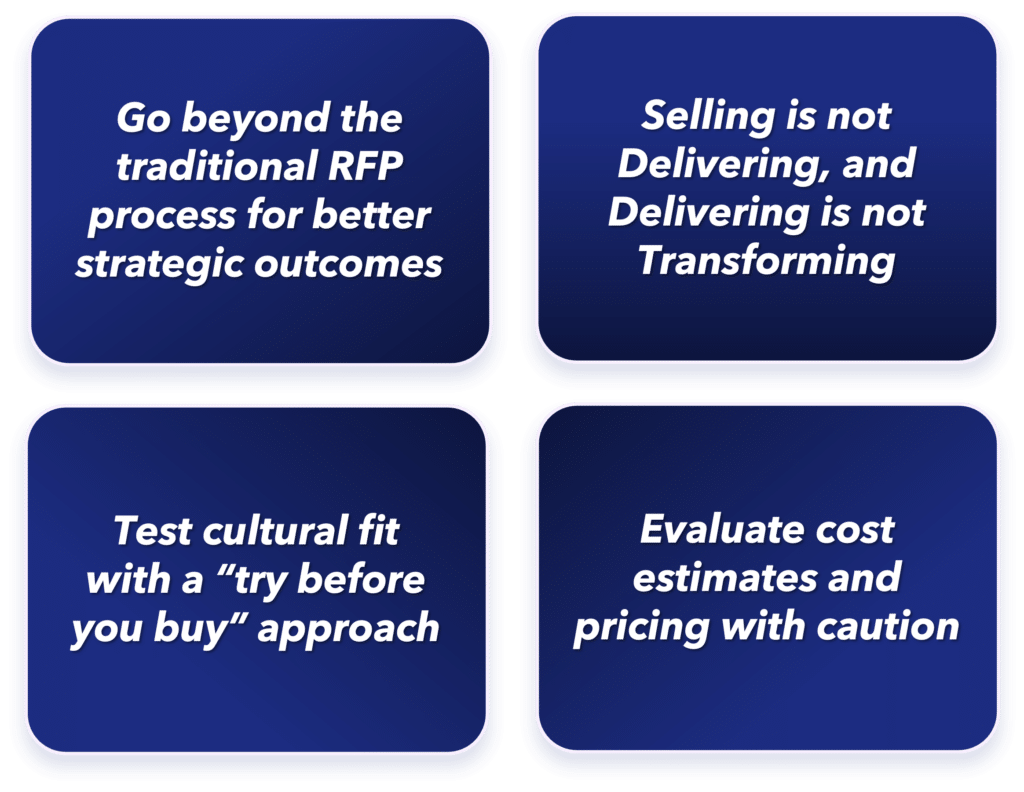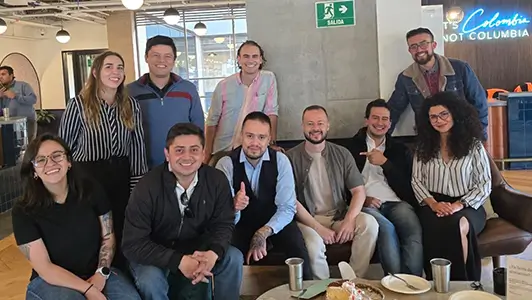Many organizations experience setbacks in their transformation efforts, often discovering too late that their chosen consulting partner lacks the cultural fit, flexibility, or strategic alignment needed for success. Traditional RFP processes and selection methods can overlook these critical elements, leading to costly disengagements and project failures. When transformation initiatives derail, the question that often follows is, “What went wrong?”
For many leaders, disappointment comes after a seemingly thorough RFP process—interviewing, vetting, and referencing multiple firms—only to see the partnership falter. In fact, a Bain survey reveals that 88% of business transformations fail to reach their original ambitions, often prompting organizations to replace their consulting partners mid-stream in hopes of redirecting and realigning the transformation. The quality of partnership is a crucial yet frequently overlooked factor that can determine the success or failure of a transformation effort.
Selecting the right partner means choosing a team that not only brings expertise but also aligns with your organization’s culture, goals, long-term vision, and business strategy. With the right alignment, your transformation journey can become a collaborative and adaptive process that maximizes success and drives sustainable growth.

Go beyond the traditional RFP process for better strategic outcomes
If you’re like many leaders, the RFP process is your starting point for assessing potential partners. While structured and efficient, a traditional RFP often falls short in evaluating how a partner will align with your strategic goals and program requirements.
RFPs are artificial by nature because everyone’s guessing: leaders don’t always know what they want or will need, respondents often want to put their best foot forward and avoid sensitive areas, and the process can be so regimented that it prevents actual opportunities for candid interactions and discussions. This approach often hides potential executive alignment issues or disagreements on solution, timeline, and objectives.
Yes, in a landscape filled with many options, an RFP process can help narrow down potential contenders, but often at the expense of actually outlining what it will take to succeed.
An artificially structured RFP process is rarely an effective way to select the right transformation partner. So what does this mean? Consider supplementing the RFP process with candid discussions and exploratory sessions that reveal whether the partner truly understands and aligns with your business strategy. These interactions allow you to observe how potential partners handle unexpected questions, adapt to challenges, and communicate transparently—essential qualities for a partner who will be responsible for helping you manage strategic initiatives.
Selling is not delivering, and delivering is not transforming
In the face of increased competition, some consulting organizations are highly skilled at the selling phase, especially for complex transformation efforts —presenting compelling slides and client success stories, and often “mirroring” your asks by saying yes without understanding the implications. However, the team involved in the sale is often not the same team that will handle delivery or guide your transformation.
Sales and delivery teams often operate under different incentives, with sales focused on revenue generation and delivery on cost management. This separation can lead to misalignment from the outset, leaving you to start over in articulating your expectations, vision, program objectives for the transformation, and preferred ways of working.
Effective transformation partners ensure team continuity throughout the selection process and execution so that discovery and commitments made during the selling phase are fully understood and honored in the execution and delivery phase. Complex transformations is rarely linear. It often takes a circuitous path to success and requires a healthy dose of realignment and flexibility.
So, when you’re evaluating potential partners, dig deep into how they ensure continuity from sales through execution. You should have the opportunity to share about incorporating flexibility, dealing with setbacks, and communicating during challenges. The right transformation partner focuses on achieving your business outcomes, maintains a cohesive approach, and reduces the risk of handoff disconnects that can derail your strategic goals. Ultimately, partnering with the same leadership team from early discovery to transformation completion greatly enhances your chances of success.
Test cultural fit with a “try before you buy” approach
During a selection process, leaders often try to gauge the fit of a future transformation partner by asking about industry experience, relevant case studies, or specific capabilities for the work. While those may be important elements to consider, they also fail to capture what will really make your partnership successful: the ability to trust each other and effectively partner (across levels) through the complex stages of your transformation initiative.
But how can you know in advance whether a partner will show the mettle, commitment, and flexibility when needed? By “trying before buying” through co-creation sessions during the selection process.
A highly effective way to assess cultural fit and compatibility during the selection process is to host a co-creation/experimentation session with each contender on a specific requirement of the transformation. This type of session can demonstrate how well they work with your team, adapt to challenges, and engage with your strategic vision.
While it does require some time investment from you, it can be a game-changer for evaluating which partner will be the best fit:
- Sessions can be two to four hours long, typically generate useful outputs, and can engage multiple facilitation techniques, just like real transformation work does.
- Topics can focus on planning exercises, technology challenges, organizational change, etc.
- The focus is on assessing the partner’s actual capability to collaborate and co-create with the potential client team and leaders.
- At the end of the session, participants can “score” each contender much more accurately based on actual, lived experience.
A co-creation session can help you assess the cultural compatibility of a consulting partner through a real-work “try before you buy” exercise. By directly engaging in real work, you get a more accurate view of their problem-solving approach and their compatibility with your team, ensuring alignment before full commitment.
Evaluate cost estimates and pricing with caution
Budget concerns are understandably central in partner selection, but prioritizing firm cost estimates too early can sometimes lead to misaligned expectations or hidden costs down the road.
In a study of over 16,000 projects, it’s reported that “a staggering 91.5% of projects go over budget, over schedule, or both” and that “the mean cost overrun is 62%”.
This report highlights the complexity and risk involved in estimating transformation costs, yet many leaders often insist on firm pricing estimates during a selection process. While consulting partners should provide meaningful estimates and visibility into the cost for their services, overly rigid pricing requests can create counterproductive incentives:
- Some consulting partners will underestimate the work to be selected with the full expectation to renegotiate after the work has started.
- Others will include an overwhelming number of assumptions to protect their financial interests.
While pricing is not always a reliable indicator for selecting a partner, you can reduce risk by asking consulting firms to price the work in meaningful components that reflect their approach and understanding of the work, as well as transparency about their estimates. In other words, let the consultant structure the pricing that aligns with how they will do the work. It may be harder to compare, but it will lead to much richer discussions about the financial dimension of the transformation and will be another great criterion for evaluating the fit of the potential partner.
Another key lever often used to control price predictability is to only commit to the first phase of the work, or first key milestone. This provides flexibility for your team to adjust expectations and requirements beyond the first contract, confirm that your selected partner is working effectively, and introduce more effort accuracy for later phases.
Transformation is about accelerating to the next level of performance, and every investment should be measured against its potential return (financial, operational, organizational, etc.) The pricing of consulting services is only one component of that investment so be careful not to overestimate the importance of early pricing and estimating. What matters more is the consulting partner’s candor, insight, and flexibility in understanding the full cost of a transformation.
Conclusion
Choosing the right transformation partner is a really critical decision for any leadership team, one that goes beyond simply selecting a service provider. It’s about building a partnership that aligns with your organization’s culture, business strategy, and program management goals. By adapting your selection process to what matters most to you and creating real-life circumstances where you can test “fit” and “alignment,” you can minimize risk, support your strategic goals, greatly improve your chances of success, and avoid the dreaded “what happened?” outcome.
Transformation initiatives are inherently complex, and setbacks are inevitable. But with the right partner—one who brings both expertise and a shared commitment to your vision—you can drive meaningful, sustainable change that propels your organization forward and ensures lasting success.
















